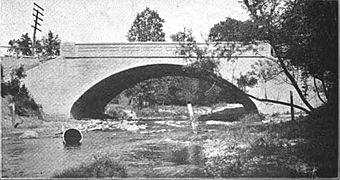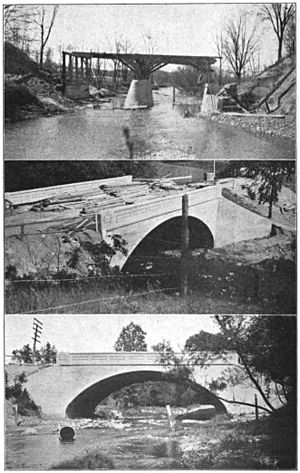Division Avenue–Plaster Creek Bridge facts for kids
The Division Avenue–Plaster Creek Bridge was an old bridge in Grand Rapids, Michigan. It carried Division Avenue over Plaster Creek. This bridge was important enough to be listed on the National Register of Historic Places in 1999. Sadly, it was taken down and replaced in 2007.
Quick facts for kids |
|
|
Division Avenue–Plaster Creek Bridge
|
|

Bridge as constructed, before 1935 widening
|
|
| Location | Division Ave. over Plaster Creek, Grand Rapids, Michigan |
|---|---|
| Built | 1914 |
| Built by | Illinois Bridge Co. |
| Architect | Michigan State Highway Department, C.V. Dewart |
| Architectural style | Spandrel arch bridge |
| MPS | Highway Bridges of Michigan MPS |
| NRHP reference No. | 99001523 |
| Added to NRHP | December 17, 1999 |
History of the Plaster Creek Bridge
In 1913, Michigan decided to create a special network of important roads. These were called a trunkline network. The state said it would help build and take care of big bridges on these roads. But only if local towns improved the three miles of road next to the bridge.
Soon, a main road south of Grand Rapids became part of this network. This road crossed Plaster Creek. But the old wooden bridge there was falling apart. So, in 1914, Kent County fixed the road nearby. Then, the state agreed to build a new bridge over Plaster Creek.
The new bridge was called Trunk Line Bridge No. 3. It was designed by C.V. Dewart. He was a bridge engineer for the Michigan State Highway Department. The state hired the Illinois Bridge Company from Chicago to build it. The bridge was finished later in 1914. It cost $6,063.09 to build.
This road later became part of US-131. In 1935, the state made the bridge wider. It grew from 28 feet wide to 43 feet wide. During this change, the original concrete railings were replaced. New steel rails were put in their place. The bridge kept carrying cars and trucks into the 2000s. However, it was replaced with a new bridge in 2007.
What the Bridge Looked Like
The Division Avenue Bridge was a type of bridge called a spandrel arch bridge. It was 50 feet long and 43 feet wide. The road surface was asphalt. There were concrete sidewalks on each side for people to walk on. Standard steel rails ran along the outside edges of the bridge.
The arch of the bridge was shaped like an oval. It connected to large concrete supports at each end. The arch ring was built right into the smooth concrete walls.




